Electric vehicles
China’s BYD to enter South Korea’s passenger electric car market
Once launched, the BYD Atto 3 will likely compete with Hyundai’s Kona EV and IONIQ 5 and Kia’s Niro and EV6
By Feb 12, 2024 (Gmt+09:00)
3
Min read
Most Read
LG Chem to sell water filter business to Glenwood PE for $692 million


KT&G eyes overseas M&A after rejecting activist fund's offer


Kyobo Life poised to buy Japan’s SBI Group-owned savings bank


StockX in merger talks with Naver’s online reseller Kream


Meritz backs half of ex-manager’s $210 mn hedge fund


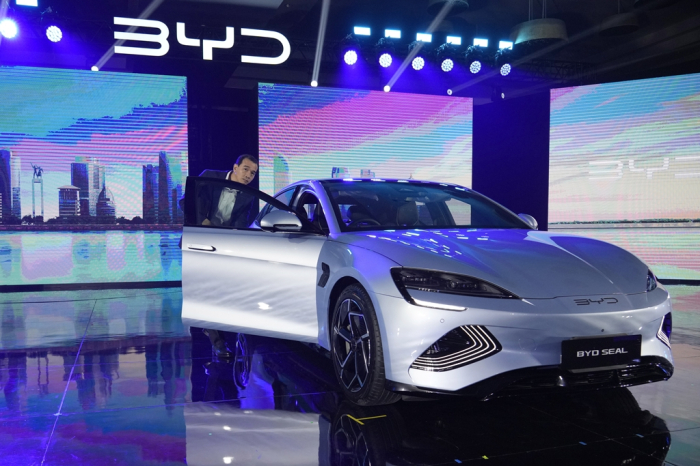
China’s BYD Co., the world’s largest electric vehicle maker, is set to enter South Korea’s passenger EV market, setting off alarm bells for Korean giants such as Hyundai Motor Co. and Kia Corp.
The Shenzhen-based Chinese EV maker is slated to have meetings with Korea’s Ministry of Environment and the Ministry of Trade, Industry, and Energy next month to obtain a permit to sell electric cars in Korea, people familiar with the matter said on Monday.
To sell electric models in Korea, foreign automakers need to obtain environmental and safety certifications for their vehicles’ driving range, energy efficiency and battery safety, and undergo an eligibility review for state EV subsidies.
The process usually takes about two to three months and if all goes to plan, BYD will likely sell its passenger EV models in Korea in the first half of this year, sources said.
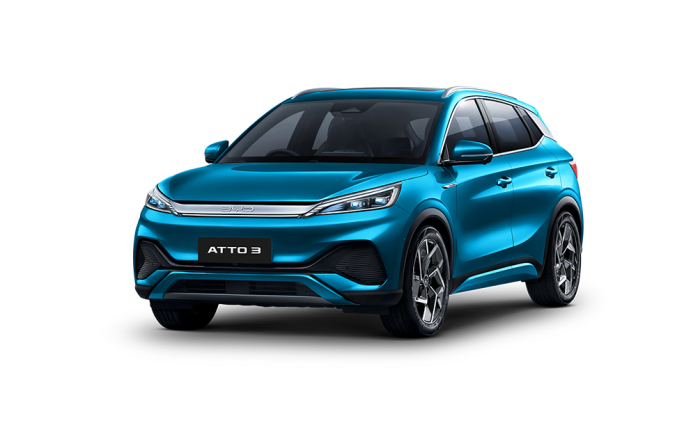
The first model that BYD plans to bring to Korea is a compact sport utility vehicle, the BYD Atto 3, sources said.
The Atto 3 is the Chinese EV maker’s first global model and its best-seller. Last year, the company sold more than 100,000 units of the model outside of China, accounting for about 40% of BYD’s entire global EV sale of 242,759 units.
The BYD Atto 3, which can run 420 km on a single charge, is sold at about 44 million won ($33,008) in Australia and Japan.
BYD has also registered the trademarks of its two other EV sedans – the midsize Seal and the hatchback Dolphin – with Korean authorities, indicating that the company also plans to take them to the Korean market.
The BYD Seal runs up to 569 km on a single charge, longer than the Tesla Model 3’s 511 km.
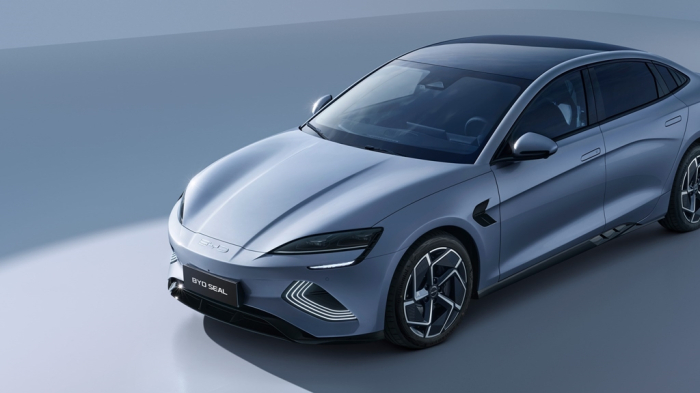
TO COMPETE WITH HYUNDAI’S KONA, IONIQ 5, KIA’S NIRO, EV6
Once brought into the Korean market, the Atto 3 is expected to compete with the likes of the Hyundai Kona Electric, the Hyundai IONIQ 5, the Kia Niro EV and the Kia EV6, industry officials said.
The Chinese automaker, backed by Warren Buffett’s Berkshire Hathaway Inc., is already selling commercial electric vehicles, including buses and trucks.
In November, Korea’s KG Mobility Corp. said it would join forces with BYD to build a battery pack factory in Korea.
Under the agreement, battery packs produced in Korea will be used in KG Mobility's compact SUV, the Torres EVX, and the electric pickup truck O100.
KG Mobility, formerly Ssangyong Motor, said it would also jointly develop with BYD next-generation hybrid vehicle systems.
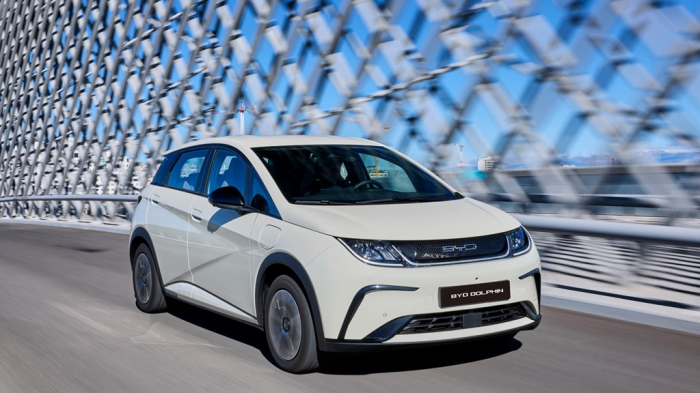
Already an EV giant in China, BYD rose to the top last year, overtaking Tesla Inc. as the world’s No. 1 EV maker.
BYD is also the world’s second-largest battery maker after top player Contemporary Amperex Technology Co. Ltd., better known as CATL.
COMPETITIVE VS GLOBAL PEERS
BYD is competitive as it can produce 75% of EV parts, including batteries, auto chips and driving software, in-house. The Chinese automaker can manufacture electric cars at costs 30% lower than its competitors, analysts said.
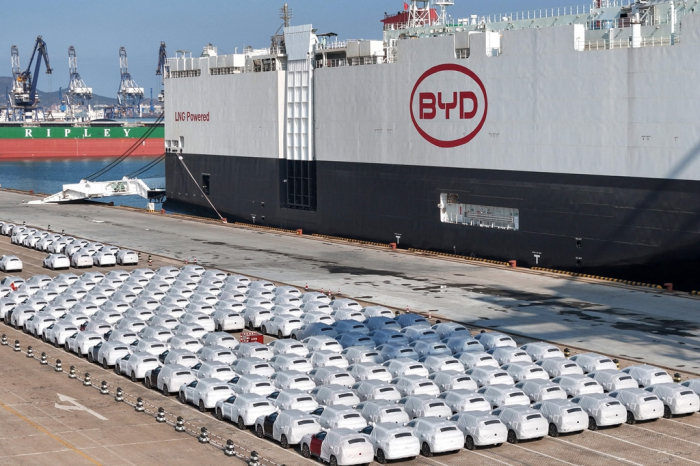
“With China’s improved car technology and design skills, Chinese cars are no longer regarded as low-end models. They are affordable and at the same time good cars,” said an industry official. “Once Chinese automakers shed their image as cheap car manufacturers, they will change the EV landscape not just in Korea but globally.”
In a Hyundai Motor business report issued in December, the Korean automaker’s outside advisory committee said: “Chinese automobiles are crossing the Great Wall of China and entering the global market like a tsunami. Hyundai and other global automakers are losing their market.”
Write to Nan-Sae Bin and Jae-Fu Kim at binthere@hankyung.com
In-Soo Nam edited this article.
More to Read
-
 AutomobilesKG Mobility, BYD to team up for battery pack, hybrid car
AutomobilesKG Mobility, BYD to team up for battery pack, hybrid carNov 02, 2023 (Gmt+09:00)
1 Min read -
 Electric vehiclesKia’s EV6 GT: Faster than supercars Lamborghini, Porsche and Ferrari
Electric vehiclesKia’s EV6 GT: Faster than supercars Lamborghini, Porsche and FerrariSep 29, 2022 (Gmt+09:00)
1 Min read -
 Electric vehiclesHyundai faces growing rivalry with China’s BYD in Southeast Asia
Electric vehiclesHyundai faces growing rivalry with China’s BYD in Southeast AsiaSep 14, 2022 (Gmt+09:00)
2 Min read -
 AutomobilesHyundai IONIQ 5, Kia EV6 rated top among electric cars in Germany
AutomobilesHyundai IONIQ 5, Kia EV6 rated top among electric cars in GermanyFeb 28, 2022 (Gmt+09:00)
2 Min read -
 Electric vehiclesKia debuts all-electric EV6; runs faster, longer than Tesla, IONIQ 5
Electric vehiclesKia debuts all-electric EV6; runs faster, longer than Tesla, IONIQ 5Mar 30, 2021 (Gmt+09:00)
2 Min read -
 Mergers & AcquisitionsSamsung sells $1.3 bn stake in China’s BYD, keeps watchers puzzled
Mergers & AcquisitionsSamsung sells $1.3 bn stake in China’s BYD, keeps watchers puzzledSep 06, 2021 (Gmt+09:00)
2 Min read
Comment 0
LOG IN


